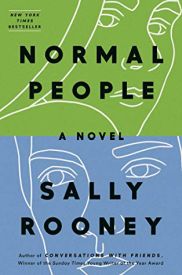Normal People
If people appeared to behave pointlessly in grief, it was only because human life was pointless, and this was the truth that grief revealed.
Connell wished he knew how other people conducted their private lives, so that he could copy from example.
Not for the first time Marianne thinks cruelty does not only hurt the victim, but the perpetrator also, and maybe even more deeply and more permanently. You learn nothing very profound about yourself simply by being bullied; but by bullying someone else you learn something you can never forget.
She’s missing some primal instinct, self-defense or self-preservation, which makes other human beings comprehensible. You lean in expecting resistance, and everything just falls away in front of you. Still, he would lie down and die for her at any minute, which is the only thing he knows about himself that makes him feel like a worthwhile person.
I liked this novel more than I thought I would, even given the hype surrounding it. I thought the focus on just two characters & their relationship might get tedious after a while but it held up surprisingly well. But for a couple of chapters towards the end, I found the story very engrossing. Even the narrative style - focusing on incidents months apart without encompassing all the time in between (though there are some ‘flashbacks’) - works surprisingly well. Overall, recommended. Parts of the novel are very powerful indeed.
Some excerpts:
They talked a little bit, or she talked and he nodded. He told her she should try reading The Communist Manifesto, he thought she would like it, and he offered to write down the title for her so she wouldn’t forget. I know what The Communist Manifesto is called, she said. He shrugged, okay. After a moment he added, smiling: You’re trying to act superior, but like, you haven’t even read it. She had to laugh then, and he laughed because she did.
Connell hasn’t commented on any of the Facebook threads, but he has liked several comments calling for the invite to be rescinded, which is probably the most strident political action he has ever taken in his life.
Generally I find men are a lot more concerned with limiting the freedoms of women than exercising personal freedom for themselves, says Marianne.
He’s not someone who feels comfortable confiding in others, or demanding things from them. He needs Marianne for this reason. This fact strikes him newly. Marianne is someone he can ask things of. Even though there are certain difficulties and resentments in their relationship, the relationship carries on. This seems remarkable to him now, and almost moving.
Marianne expressed her feelings about Connell mainly in terms of her sustained interest in his opinions and beliefs, the curiosity she feels about his life, and her instinct to survey his thoughts whenever she feels conflicted about anthing. He expressed himself more in terms of identification, his sense of rooting for her and suffering with her when she suffers, his ability to perceive and sympathize with her motivations. Marianne thought this had something to do with gender roles. I think I just like you a lot as a person, he replied defensively. That’s actually very sweet, she wrote back.
There’s always been something inside her that men have wanted to dominate, and their desire for domination can look so much like attraction, even love. In school the boys had tried to break her with cruelty and disregard, and in college men had tried to do it with sex and popularity, all with the same aim of subjugating some force in her personality. It depressed her to think people were so predictable. Whether she was respected or despised, it didn’t make much difference in the end. Would every stage of her life continue to reveal itself as the same thing, again and again, the same remorseless contest for dominance?
Connell’s initial assessment of the reading was not disproven. It was culture as class performance, literature fetishized for its ability to take educated people on false emotional journeys, so that they might afterward feel superior to the uneducated people whose emotional journeys they liked to read about.
From a young age her life has been abnormal, she knows that. But so much is covered over in time now, the way leaves fall and cover a piece of earth, and eventually mingle with the soil. Things that happened to her then are buried in the earth of her body. She tries to be a good person. But deep down she knows she is a bad person, corrupted, wrong, and all her efforts to be right, to have the right opinions, to say the right things, these efforts only disguise what is buried inside her, the evil part of herself.
The main reasons for not giving it 5 stars are i) as I mentioned, a couple of chapters towards the end become a bit too tedious, and ii) some of the writing seems to try too hard. For example:
He changes gears [of the car] with a domineering gesture of his hand.
Yes, we get it, he’s dominating and she’s submissive.
Or the obsession with cherries:
Cherries hang on the dark-green trees like earrings.
…
The cherries glow dimly on trees.
…
The cherries hang around them gleaming like so many spectral planets.
Or
It gives Marianne a window onto real happiness, though a window she cannot open herself or ever climb through.
Or a bit too meldramatic:
He feels like he has ruined the life of everyone who has ever even marginally liked him.
All book cover images are from Goodreads unless specified otherwise.
